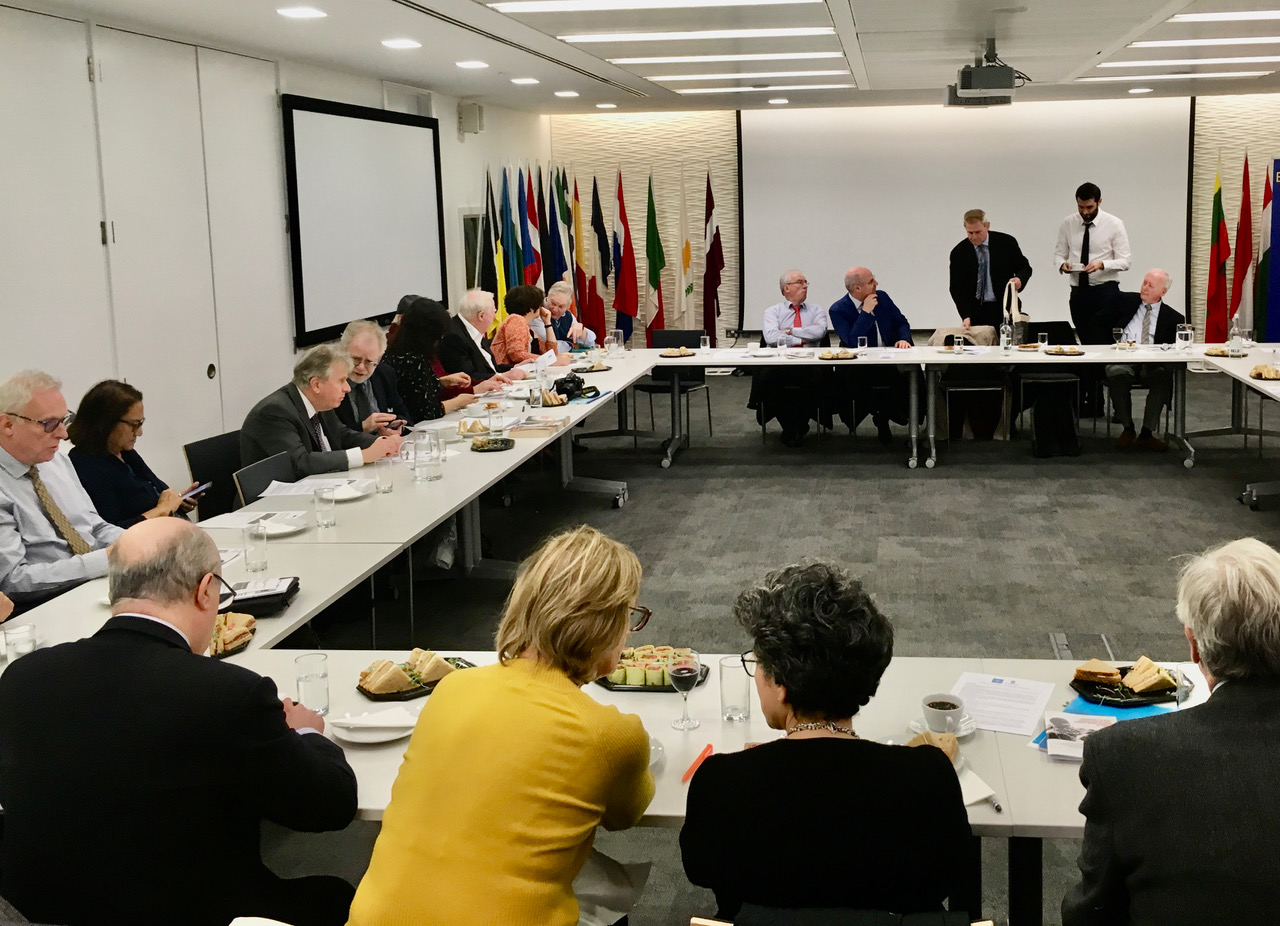In 2018 Brexit dominated AEJ UK lunchtime meetings just as it did for most of the year’s news agenda.
22 November 2018
Sir Nigel Sheinwald – Bleak outlook with Brexit says former top UK diplomat
Sir Nigel Sheinwald, one of the UK’s top diplomats before he retired, is not hopeful.
In a meeting with the AEJ UK on November 22 to discuss Britain’s future after Brexit he asked if there are grounds for optimism.
And his conclusion was very few. He said outside the EU, the UK would lose influence at a practical level and would lose stature in the view of the rest of the world.
And the UK’s position is further weakened by two other factors he added – the fraying of its relationship and influence with the United States under President Donald Trump, and threats to the multilateral system of alliances and institutions that has served much of the western world for 70 years since the Second World War.
Sir Nigel has 36 years experience as a UK diplomat including his three final jobs as UK ambassador to the US from 2007 to 2012, foreign policy and defence advisor to Prime Minister Tony Blair from 2003 to 2007, and UK Ambassador to the EU from 2000 to 2003.
Despite his pessimistic view of the future he did have some advice for UK action after Brexit so for more on his thoughts please read this report from former FT correspondent Peter Norman.
4 September 2018
Lord Peter Lilley – No deal Brexit will work..
says Lord Peter Lilley, former Conservative cabinet minister and outspoken supporter of the UK’s exit from the European Union.
He outlined his arguments to the AEJ UK’s first autumn lunch meeting on September 4 in a presentation he described as intentionally provocative.
It came as the UK government faced make or break negotiations with the EU on their future relationship and widespread criticism of its Chequers negotiating plan both inside Parliament and across the UK.
Peter Lilley says the Chequers plan is “moribund” and adds that the May government looks like it needs lessons in trade negotiating and is giving lessons in political suicide.
Most important, says Lilley, is what the UK does with the powers it takes back with Brexit. Ultimately he says Brexit is a political issue and urged people not to exaggerate the importance of trade deals.
For more on his presentation please see this report on the meeting from AEJ member and former FT correspondent Peter Norman and this audio record of the meeting.
25 June 2018
Paul Lever – Germany and the EU
Both supporters and opponents of Brexit might want to consider their expectations of Germany’s role in the process.
That was NOT the message to the AEJ UK from Britain’s former ambassador to Germany – but it was inherent in his wide ranging and in depth analysis of Germany’s role in Europe.
Sir Paul Lever, UK ambassador to Germany from 1997 to 2003 and author of a recent book on the subject, says despite becoming Europe’s dominant power, Germany has limited policy ambitions and no blueprint for Europe’s future.
At the AEJ UK on June 25, Sir Paul said Germany’s key goals are supporting its national interests and economic strength while preserving what has already been achieved in Europe. So it is unlikely to show any appetite for grand EU integration plans as suggested by France’s President Emmanuel Macron – and has already shown constraints on any support for adjustments to the EU’s trading relations with Britain under both UK Prime Ministers David Cameron and Theresa May.
For more on Sir Paul’s wide ranging and in-depth analysis please see this report by AEJ member and former FT correspondent Peter Norman and this audio record of his remarks and following discussion.
24 May 2018
Baroness Dianne Hayter of Kentish Town – Labour’s balancing act
As Brexit continues to divide both of the UK’s two major political parties and the British people, Labour’s shadow deputy leader in the House of Lords and spokesperson for exiting the EU walked the fine line between Labour’s stance on Brexit and political realities.
At a meeting of the AEJ UK on 24 May 2018, Baroness Dianne Hayter of Kentish Town explained why she and other Labour members of the unelected House of Lords had challenged the UK government by forcing a series of amendments to the EU Withdrawal Bill in the upper house.
She says Labour is attempting to move Conservative Prime Minister Theresa May away from her hard red lines in negotiations with the EU and believes the final decisions on Brexit should be in the hands of MPs in the House of Commons.
She also thinks that the Lords votes for 15 amendments to the government’s withdrawal bill may influence public opinion and debate on the kind of Brexit that will eventually happen.
She acknowledged there was no clear evidence of a shift in public support or opposition to Brexit in most polling results since the referendum, including Labour’s own private polling and her own contacts with voters.
There is however a recent analysis of multiple polls by the YouGov polling organization that questions this orthodoxy and suggests some possibly important shifts away from Brexit.
Baroness Hayter was walking her own fine line inside Labour as a former strong supporter of Tony Blair now articulating a position under EU-sceptic party leader Jeremy Corbyn. She personally opposed Brexit and considers it a looming nightmare, but insists that the Labour party will honour the result of the June 2016 referendum.
Baroness Hayter was Labour Party chairman from 2007-8, became a Labour peer in 2010, and previously held senior posts in the legal, financial and consumer affairs industries.
For more on this meeting please see this article by AEJ member Nick Hopkinson and this audio record of her remarks and following discussion.
19 April 2018
Dr. Yu Jie – China and the world
AEJ UK members received some wide-ranging insight into Chinese thinking at a meeting on April 19 2018.
Dr Yu Jie, head of China Foresight at the London School of Economics foreign policy think tank, said President Xi Jing Ping’s immediate plans are to eliminate factions inside the Chinese Communist Party and establish China as a global power.
Yu Jie has advised Chinese state-owned companies on European investment and leading European firms seeking to forge strategies for the Chinese market.
For more on her thoughts please see this report from AEJ member and former FT correspondent Peter Norman and here for an audio record of her remarks.
23 March 2018
David Isaac – Will Brexit damage human rights in the UK?
The chairman of the UK Equality and Human Rights Commission says it could if the government’s Brexit withdrawal bill is not changed.
At the AEJ UK on 23 March 2018, David Isaac explained the basis for his concern – backed by a number of NGOs working on human rights in the UK – that plans for incorporating European into English (and Scottish and Northern Ireland) law did not live up to the government’s promise that Brexit would leave our rights unchanged.
Please see this account from Hugh Sandeman and here for an audio record of the meeting.
20 February 2018
Bob Bischof – German business on Brexit
There will be a Brexit deal says the leading voice of German business in the UK.
Bob Bischof, vice president of the German British Chamber of Industry and Commerce and chairman of the German British Forum, said German business is confident of a Brexit deal and made his case at an AEJ UK meeting on February 20 2018.
See here for a report on the meeting from AEJ member and former FT correspondent Peter Norman. And here for an audio record of his remarks and subsequent questions and answers.
17 January 2018
Sergei Guriev – Democracy and Populism
The European Bank for Reconstruction and Development’s chief economist says populist government benefits corrupt elites.
And Sergei Guriev, linking the rise of nationalist populism in western countries with “reform reversal” in some post-communist countries, argues that populist governments remove political checks and do not create free markets and democracy whereas states which consolidate democracy do well.
He was speaking at the AEJ’s first meeting of 2018 on January 17 about the political economy of reform in Europe and its neighbourhood.
Dr. Guriev is a former senior Russian economic policy advisor now in exile and working for the EBRD. His bank’s Transition 2017-18 report shows economic performance in many parts of the former Soviet Union has fallen behind other global emerging markets because of excessive state controls and weak corporate governance.
His remarks before he went off the record are here – and they prompted these personal reflections from AEJ member Anthony Robinson, a former east Europe editor of the Financial Times.








